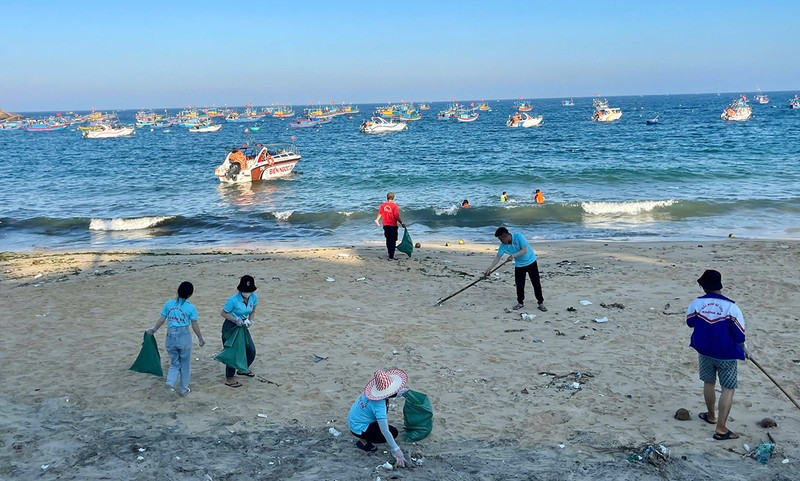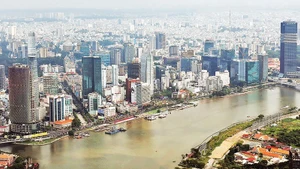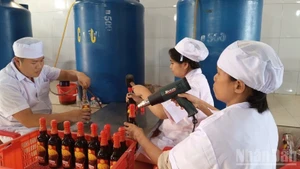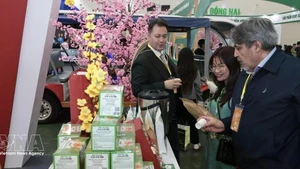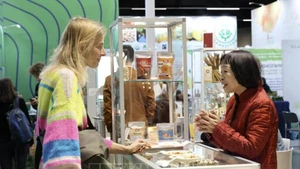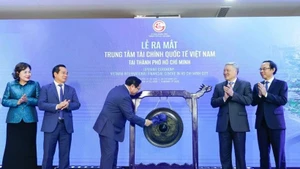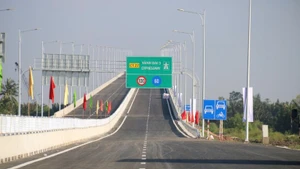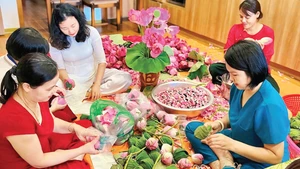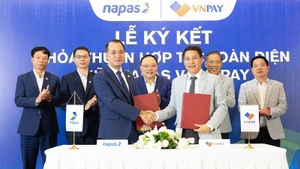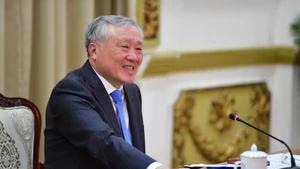Joining hands to protect the environment
Binh Dinh Province has launched many major programmes responding to World Environment Day, while organising practical activities such as coastal waste management, coral reef protection, and aquaculture monitoring. Particularly, community environmental management groups have been established in coastal communes such as Nhon Ly, Nhon Hai (Quy Nhon City), and Cat Tien (Phu Cat District), responsible for ensuring sustainable tourism development while combining exploitation of marine resources with ecological protection.
Nguyen Huu Dao, a member of the community group protecting aquatic resources in Nhon Ly Commune, shared that after considerable efforts by relevant departments and the community group, the coral reef ecosystem at Bai Dua is being restored. Along with direct intervention activities to protect coral reefs, community group members actively meet with residents to disseminate policies, orientations and planning so that people understand and work together to build their homeland.
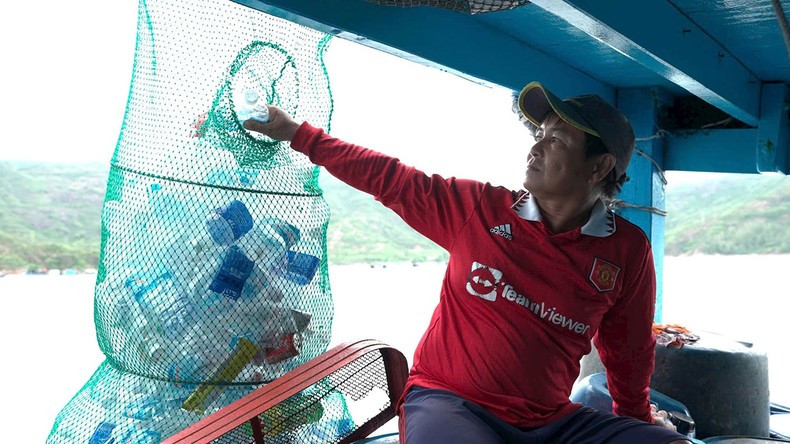 |
| Fishermen sort rubbish on their boats. |
“We have designed experiential activities for tourists not only to visit beautiful scenery but also to directly participate in plastic waste collection, in exchange for environmentally friendly souvenirs. This model has received strong applause from tourists, helping them have interesting practical experiences while contributing to raising awareness of protecting our seas,” said Dao.
Every week, Nguyen Ton Xuan Sang, leader of the coral protection group in Nhon Hai Commune, joins group members in organising diving sessions to collect rubbish, keeping the waters of their homeland cleaner. Starting from their love of the ocean and desire to preserve the marine ecosystem, they understand that coral reefs are the lungs of the sea, a place for many marine species to grow and shelter - without protective measures, the entire sea area will soon lose its inherent life and beauty.
Nguyen Hoang Nam, Vice Chairman of Nhon Hai Commune, said that not only with local government participation, community management groups in coastal communes have also pioneered underwater cleaning, helping to reduce plastic waste, especially in aquaculture and coral reef areas.
Binh Dinh Environment Company has coordinated with commune authorities to ensure that waste from aquaculture and fishing activities is processed properly. Currently, 100% of households have been mobilised to collect rubbish daily and bring it to collection points for processing, avoiding waste flowing into the sea and causing pollution.
Efforts from fishermen and enterprises
Along with fishing activities, the issue of domestic plastic waste discharged into the sea from fishing boats is seriously affecting Binh Dinh’s marine ecosystem. The Department of Agriculture and Environment has coordinated with Quy Nhon City People’s Committee and Binh Dinh Fishing Port Management Board to organise the implementation of a waste collection model from fishing boats in the fishing community.
Accordingly, boats operating offshore do not dump rubbish into the sea but collect waste on board, bringing it ashore after each trip. Fishermen are encouraged to prepare waste containers on boats while sorting rubbish to facilitate processing when docking. For cage fish farming households, the model of collecting excess feed and plastic waste from cage rafts is being widely implemented, ensuring all waste from the farming process is properly handled.
Recently, the model has been implemented on 200 offshore fishing boats, including 100 fishing boats regularly docking at Quy Nhon Fishing Port, and 100 fishing boats operating at De Gi Fishing Port (Phu Cat District) and Tam Quan Fishing Port (Hoai Nhon Town).
According to surveys by functional agencies, on average each sea trip lasting 20 days, domestic waste from fishing boats is recorded as follows: With 14kg of plastic from drinking water bottles and food on each fishing boat per sea trip, multiplied by 200 fishing boats, one can see the large amount of plastic that would be discharged without collection measures.
Additionally, with packaging materials for seafood preservation also accounting for 6kg of plastic per fishing boat, this shows the fisheries sector needs to pay more attention to using environmentally friendly materials. In 2024, the model collected a total of 2,300kg of waste materials, with plastic accounting for up to 82% (1,880kg). At Quy Nhon Fishing Port alone, collection reached 1,600kg, accounting for the majority of total collection.
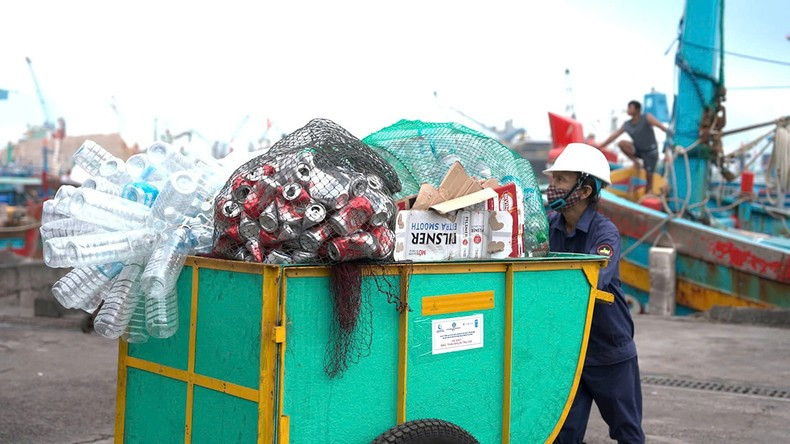 |
| The waste collection model from fishing boats is bringing positive results in protecting the marine environment. |
From these figures, it can be seen that if the model is expanded, it will not only help protect the marine environment but also bring positive impact in changing fishermen’s habits.
Fisherman Le Van Hung, captain of a fishing boat participating in the model, shared: “I realise the amount of waste on board each sea trip is not small at all. Previously, we didn’t think about collecting rubbish, but since participating in this model, crew members on board all actively put rubbish in mesh bags to bring back to port.”
Dao Xuan Thien, Director of Binh Dinh Fishing Port Management Board, said that as the first locality to implement the plastic waste collection model from fishing boats in a closed process, Binh Dinh has created an important precedent for expanding this model to other coastal provinces.
In the coming time, Binh Dinh will expand the scale of the model, combining more effective plastic waste treatment solutions, strengthening cooperation with environmental organisations to support fishermen participating in the model. This model is not only a situational solution but also opens up a long-term direction in marine environmental protection in Viet Nam.
Tran Van Vinh, Deputy Head of the Binh Dinh Fisheries Sub-Department, said that after more than two years of implementation, the model has raised awareness among crew members working on fishing boats about ocean plastic waste.
To ensure collection activities occur systematically, management agencies have built a closed process. Before docking, boat captains declare the amount of plastic waste on board, from which collection units receive and process according to proper procedures. Along with this, a plastic waste collection team on fishing boats has been established. This team belongs to Binh Dinh Fishing Port Management Board, responsible for collecting, transporting and sorting waste at the port. Additionally, the model also provides waste collection mesh bags for fishing boats, helping crew members proactively collect rubbish instead of discharging it into the sea.
With decisive actions, Binh Dinh is gradually building a sustainable marine economic development model, ensuring both growth and preservation of natural resources.
